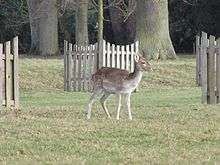Hackwood Park
| Hackwood Park | |
|---|---|
_p2.074_-_Hackwood_Park%2C_Hampshire.jpg) Hackwood Park, 1818. | |
| General information | |
| Type | Manor |
| Town or city | Basingstoke, Hampshire |
| Country | United Kingdom |
| Coordinates | 51°14′42″N 1°03′54″W / 51.245°N 1.065°WCoordinates: 51°14′42″N 1°03′54″W / 51.245°N 1.065°W |
| Construction started | 1683 |
| Completed | 1687 |
Hackwood Park is a 51,681 square feet (4,801.3 m2) grade I listed park and house in Basingstoke, Hampshire, in the district of Basingstoke and Deane.
History
The estate was park of the Manor of Eastrop until 1223, when it became a deer park for the nobility.[1] It was acquired by William Paulet, 1st Marquess of Winchester in the sixteenth century.[1]
The property was built from 1683 to 1687 for Charles Paulet, 1st Duke of Bolton.[1] It has 24 bedrooms and 20 bathrooms.[2] The estate was inherited by his son, Charles Paulet, 2nd Duke of Bolton in 1699, followed by his grandson, Charles Powlett, 3rd Duke of Bolton in 1672.[1] The grounds, known as Spring Wood, were designed by Charles Bridgeman, with additional buildings designed by James Gibbs.[1]
The estate was painted by Paul Sandby in 1764.[3]

In the 20th century, the estate belonged to William Berry, 1st Viscount Camrose.[2] During World War II, it served as a hospital for the Royal Canadian Army.[2] When Viscount Camrose died in 1954, the property was inherited by his son, Seymour Berry, 2nd Viscount Camrose, who remained its owner until his death in 1995.[2] His wife, Lady Camrose, the mother of Aga Khan IV, lived there until her death in 1997.[2]
See also
References
| Wikimedia Commons has media related to Hackwood Park. |
- 1 2 3 4 5 "HACKWOOD PARK". Historic England. Retrieved May 4, 2016.
- 1 2 3 4 5 Gordon, Amie (April 25, 2016). "Britain's most expensive estate ever publicly on the market which was once home to the Aga Khan's mother goes up for sale for more than £65MILLION". The Daily Mail. Retrieved May 4, 2016.
- ↑ Tobin, Beth Fowkes (2005). Colonizing Nature: The Tropics in British Arts and Letters, 1760-1820. Philadelphia, Pennsylvania: University of Pennsylvania Press. p. 88. ISBN 9780812238358. OCLC 55633674.